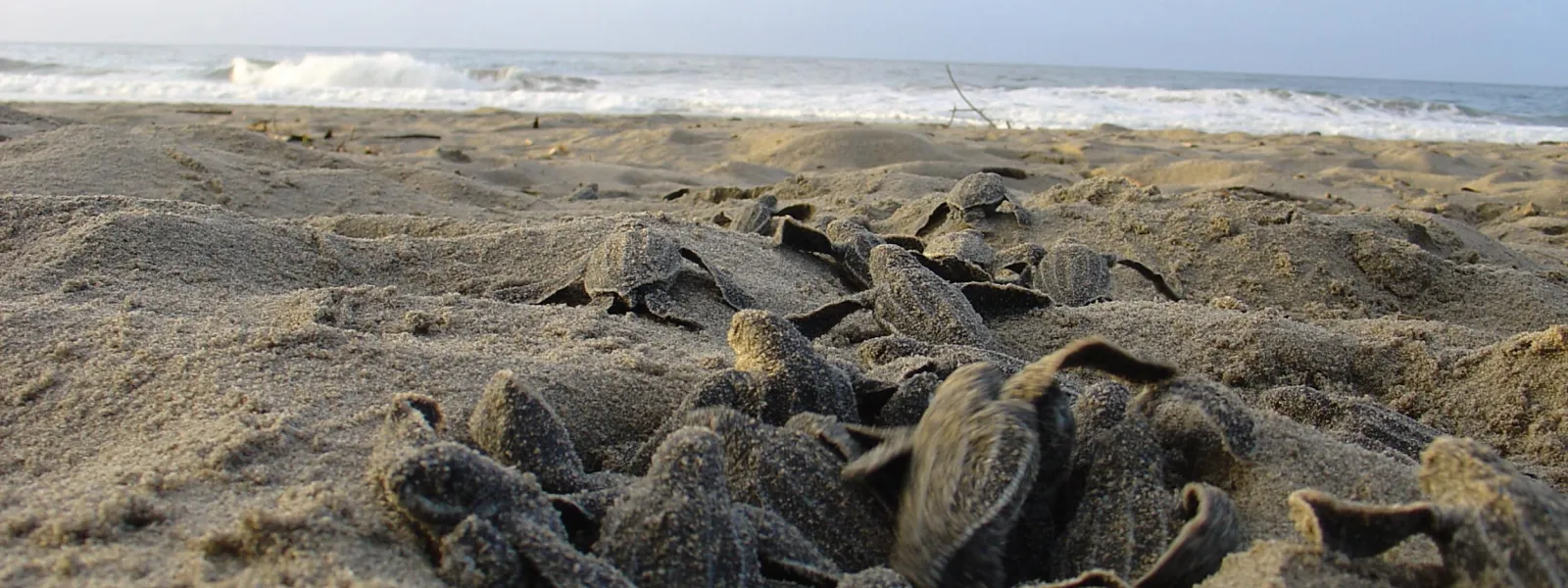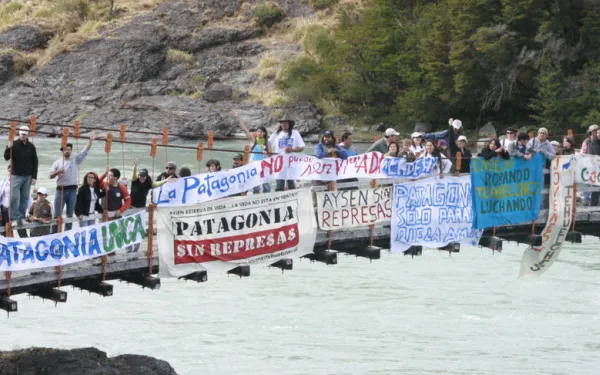
Project
Victory: Haven for leatherback sea turtles declared off-limits
In two separate rulings in May 2008, the Costa Rican government stood up for endangered leatherback sea turtles against business interests intent on building within their protected habitat.
A relative of dinosaurs, the endangered leatherback sea turtle has continually found its home in Costa Rica under threat. Poor planning and lack of oversight destroyed its nesting beaches in Flamingo and Tamarindo.
This time developers had their eye on the Leatherback National Marine Park (LNMP), home to some of the most important Leatherback nesting beaches in the Eastern Pacific Ocean.
A municipal zoning regulation was enacted that would authorize construction in part of the LNMP. However, AIDA and its local partner CEDARENA, together with the Leatherback Trust, successfully defended the park.
The Constitutional Chamber of the Costa Rican Supreme Court nullified the municipal zoning regulation, safeguarding the Leatherback sea turtles and their nesting beaches. This ruling closely followed another court victory by AIDA, CEDARENA, and Justice for Nature that required the government to expropriate the private lands within the LNMP, otherwise destined to be tourist playgrounds.
The leatherback sea turtle will continue to face threats from tourism development, fishing, egg poaching, and pollution. However, AIDA and its partners have shown that the law can be used to make a powerful difference.
Related projects
COP21's International Human Rights Day
Programme of Events - December 10, 2015 10:00 - 10:30 Press Conference (Le Bourget, Hall 5, Press Conf. Room 2). Hosted by Office of the High Commissioner on Human Rights. 11:00 - 12:30 Side Event: Fight Climate Change, Eradicate Poverty and Ensure Access to Rights—The Challenge of a Truly Just Transition (Espace Générations Climat, Room 4). Hosted by Secours Catholique - Caritas France and ATD Quart Monde. 11:30 - 13:00 Side Event: Climate Change: One of the Greatest Human Rights Challenges of Our Time (Le Bourget, Hall 4, Observer Room 12). Hosted by the Human Rights & Climate Change Working Group, Geneva Climate Change Concertation Group, CARE International, Center for International Environmental Law, Earthjustice, Franciscans International, Friedrich-Ebert-Stiftung and Human Rights Watch. 13:00 - 13:30 Civil Society Action: Stand Up for Human Rights (Le Bourget, TBD). 13:00 - 14:30 Side Event: Climate Change and Human Rights: Focus on Urban Life, Human Rights and Adaptation to Climate Change (Espace Générations Climat, Room 4). Hosted by European Association of Geographers. 15:45 - 17:00 Photo Exhibition and Film Screening: There Is No Time Left: Climate Change and Human Rights in Turkana County, Kenya (Espaces Générations Climat, Round House and Stand A28). Hosted by Human Rights Watch. 17:30 - 19:00 Side Event: Agir Contre le Climat et Promouvoir les Droits Humains: Solutions Pratiques (Espace Générations Climat, Room 1). Hosted by the Human Rights & Climate Change Working Group and Réseau Climat & Développement. 18:30 - 21:00 Human Rights Day Celebration (Point Ephemere, 200 quai de Valmy 75010 Paris). Hosted by the Tri-Caucus, Accra Caucus, Geneva Group, Human Rights & Climate Change Working Group, Indigenous Peoples Caucus, and REDD+ Safeguards Working Group.
Read moreA Human Rights Based Approach to Climate in Latin America
By María José Veramendi Villa, AIDA senior attorney, and Camila Bustos, Nivela lead researcher A few days before the beginning of the climate negotiations in Paris, the Office of the High Commissioner for Human Rights submitted an official document to the 21st Conference of the Parties to the United Nations Framework Convention on Climate Change on “Understanding human rights and climate change”. For many, the link between these two remains unclear. Aren’t there already other international agreements that discuss this issue in depth? What is the point of including human rights language in a climate change agreement? The link between human rights and climate change has been recognized long ago by the UN Human Rights Council, which has passed several resolutions to bring attention to this issue. Several countries are already feeling the impacts of climate change: rising sea levels, droughts, extreme weather events and floods among other disasters are becoming increasingly common. Latin America and the Caribbean is one the most vulnerable regions to climate change. People and communities across the region are suffering from devastating impacts such as the melting of glaciers in the Andes, rising sea levels, and ocean acidification. Many face the risk of losing their traditional livelihoods and being displaced. The impacts of climate change on the enjoyment of human rights in Latin America have been thoroughly documented by the Interamerican Association for Environmental Defense in its 2011 report on Climate Change and Human Rights. One of the most shocking impacts includes the drastic reduction to water in the region. By the year 2025, melting glaciers, the degradation of wetlands, intense droughts and erratic meteorological patterns will limit access to water to more than 50 million people in the tropical Andean region. Other anticipated effects include flooding and changing rain patterns. In Colombia, flooding affected more than 2.2 million people and cost $300 million USD in 2010 alone. In the transition to a low-carbon and resilient economy, countries are already working to design and implement projects that reduce greenhouse gas emissions and protect citizens from climate change impacts. A reference to human rights in the operational section of the agreement can ensure that human rights are taken into account in the process of developing and implementing climate policies. This is why: It will raise the ambition and strengthen the agreement promoting an implementation that will ensure that parties comply with their already existing human rights obligations. It will support the goals of the agreement by preventing discrimination, exclusion and inequality. The affected communities have to have a say in the policies and projects designed to help them. It will not create additional obligations, but ensure that there is coherence in the international regime. Parties are already obliged to comply with other human rights instruments, including the Universal Declaration of Human Rights. As the world turns its attention to Paris, we cannot forget to humanize climate change and remember that those who have contributed to the least to the problem are and will continue to be the most affected. If we want to ensure a livable planet for the future generations the new climate agreement must include the respect, protection, promotion and fulfilment of human rights. We call on all State Parties and specially those of our Latin American region to support the inclusion of human rights protections in the agreement.
Read more
Climate initiatives must not include large hydropower projects – NGOs
In a global manifesto released today, a coalition of more than 300 civil society organizations[i] from 53 countries called on governments and financiers at the Paris climate talks to keep large hydropower projects out of climate initiatives such as the Clean Development Mechanism, the World Bank’s Climate Investment Funds, and green bonds. Large hydropower projects emit massive amounts of methane, make water and energy systems more vulnerable to climate change, and cause severe damage to critical ecosystems and local communities. Including them in climate initiatives crowds out support for true climate solutions such as wind and solar power which have become readily available, can be built more quickly than large dams and have a smaller social and environmental footprint. “Particularly in tropical regions, hydropower reservoirs emit significant amounts of greenhouse gases, comparable to the climate impact of the aviation sector”, said Peter Bosshard, interim Executive Director of International Rivers. “For environmental, social and economic reasons, large hydropower projects are a false solution to climate change.” “Large hydropower projects have serious impacts on local communities and often violate the rights of indigenous peoples to their lands, cultural integrity and free, prior informed consent”, said Joan Carling, Secretary General of the Asia Indigenous Peoples Pact (AIPP). “The resistance of dam-affected communities has often been met with egregious human rights violations.” “Hydropower dams make water and energy systems more vulnerable to climate change,” said Himanshu Thakkar, the founder of the South Asia Network on Dams, Rivers and People (SANDRP). “Dam building has exacerbated flood disasters in fragile mountain areas. At the same time more extreme droughts increase the economic risks of hydropower, and have greatly affected countries that depend on hydropower dams for most of their electricity.” “Wind and solar power have become readily available and financially competitive, and have overtaken large hydropower in the addition of new capacity,” said Astrid Puentes, co-Executive Director of the Interamerican Association for Environmental Defense (AIDA). “The countries of the global South should leapfrog obsolete dam projects and promote energy solutions that are gentle to our climate, our environment and the people that depend on it.” Background Large hydropower projects are often propagated as a “clean and green” source of electricity by international financial institutions, national governments and other actors. They greatly benefit from instruments meant to address climate change, including carbon credits under the Clean Development Mechanism (CDM), credits from the World Bank’s Climate Investment Funds, and special financial terms from export credit agencies and green bonds. The dam industry advocates that large hydropower projects be funded by the Green Climate Fund, and many governments boost them as a response to climate change through national initiatives. For example, at least twelve governments with major hydropower sectors have included an expansion of hydropower generation in their reports on Intended Nationally Determined Contributions (INDCs). Support from climate initiatives is one of the main reasons why more than 3,700 hydropower dams are currently planned and under construction around the world. Further information The civil society manifesto, Ten Reasons Why Climate Initiatives Should Not Include Large Hydropower Projects, is available here. The new video, A Wrong Climate for Damming Rivers, is available at https://youtu.be/UnG_b6egjFk. The following launch events for the manifesto and video will be held in Paris this week: Saturday, December 5th, 12 pm: Press Conference with indigenous leaders and human rights defenders at the International Rights of Nature Tribunal (Maison des Métallos, 94 Rue Jean-Pierre Timbaud, 75011). December 5th, 6 pm - The manifesto and video will be presented at event hosted by the Bianca Jagger Human Rights Foundation (Galerie Thaddaeus Ropac Paris Pantin, Salzburg, 69, Avenue Du Géneral Lecler, 93500, Pantin). Journalists interested in attending should send a request via e-mail by end-of-day December 3rd to: [email protected]. [i] Sponsors: Asia Indigenous Peoples Pact, Asociación Interamericana para la Defensa del Ambiente, Amazon Watch, Bianca Jagger Human Rights Foundation, Carbon Market Watch, France Liberte, International Rivers, Jeunes Volontaires pour l'Environnement International, Oxfam International, REDLAR, Ríos Vivos, Rivers Without Boundaries; South Asia Network on Dams, Rivers and People and Urgewald.
Read more